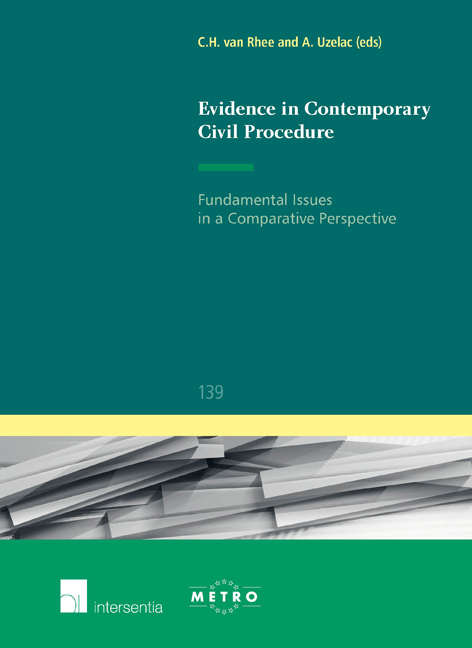Book contents
- Frontmatter
- Contents
- List of Authors
- Acknowledgements
- INTRODUCTION
- FUNDAMENTAL AND OTHER PRINCIPLES OF EVIDENCE IN CIVIL LITIGATION
- TYPES OF EVIDENCE IN CIVIL LITIGATION
- WITNESS TESTIMONY IN DUTCH CIVIL PROCEDURE: FACTS, FIGURES AND STATISTICAL RELATIONS
- CURBING ADVERSARIAL EXCESSES: AN EVALUATION OF THE EXPERT EVIDENCE REGIME IN HONG KONG AFTER THE CIVIL JUSTICE REFORM (WITH A FOCUSED STUDY ON PERSONAL INJURY LITIGATION)
- THE NEW RULES OF EXPERT EVIDENCE IN MACEDONIAN CIVIL PROCEDURE: ARE THEY A FAILED EFFORT AT REFORM?
- EVIDENCE IN ARBITRATION AND NATIONAL CIVIL LITIGATION
- REGISTRAR
- EVIDENCE IN CROSS BORDER CIVIL LITIGATION
- IUS COMMUNE EUROPAEUM
THE NEW RULES OF EXPERT EVIDENCE IN MACEDONIAN CIVIL PROCEDURE: ARE THEY A FAILED EFFORT AT REFORM?
from TYPES OF EVIDENCE IN CIVIL LITIGATION
Published online by Cambridge University Press: 15 December 2017
- Frontmatter
- Contents
- List of Authors
- Acknowledgements
- INTRODUCTION
- FUNDAMENTAL AND OTHER PRINCIPLES OF EVIDENCE IN CIVIL LITIGATION
- TYPES OF EVIDENCE IN CIVIL LITIGATION
- WITNESS TESTIMONY IN DUTCH CIVIL PROCEDURE: FACTS, FIGURES AND STATISTICAL RELATIONS
- CURBING ADVERSARIAL EXCESSES: AN EVALUATION OF THE EXPERT EVIDENCE REGIME IN HONG KONG AFTER THE CIVIL JUSTICE REFORM (WITH A FOCUSED STUDY ON PERSONAL INJURY LITIGATION)
- THE NEW RULES OF EXPERT EVIDENCE IN MACEDONIAN CIVIL PROCEDURE: ARE THEY A FAILED EFFORT AT REFORM?
- EVIDENCE IN ARBITRATION AND NATIONAL CIVIL LITIGATION
- REGISTRAR
- EVIDENCE IN CROSS BORDER CIVIL LITIGATION
- IUS COMMUNE EUROPAEUM
Summary
Introduction
For decades now, it has been claimed that as regards civil procedural law the Republic of Macedonia belongs to the Continental tradition and more precisely to the so-called ‘Germanic legal circle’. Just as in the other ex-Yugoslav republics, the fundamentals of Macedonian civil procedure are deeply rooted in the Roman law tradition within the Germanic circle. It was the Austrian Code of Civil Procedure of 1895 that traditionally provided the inspiration and model solutions for civil procedural issues. However, this practice was discontinued beginning about ten years ago. A striking trend of convergence between the common law and Continental legal systems spread to Macedonia, resulting in a completely different approach to the concept of civil proceedings in general, and particularly with regard to the rules of evidence. The changed position of expert evidence as a particular means of evidence in Macedonian civil procedure seems to be one of the best examples of shifting from the typically Continental approach to the more adversarial approach.
This contribution aims to analyse the altered rules of expert evidence in Macedonian civil procedure and also to reflect on the extent to which the changed position of expert evidence has not lived up to the expected improvement in efficiency and cost cutting, which were the prime reasons for the change.
A Summary of the Regime of Expert Evidence in Macedonian CivilProcedure before 2010
Following the independence of Macedonia in 1991, the Yugoslav Civil Procedure Act of 1976 continued to apply until 1998, when the first Macedonian Civil Procedure Act came into force. Although at that time the country went through a period of fundamental changes in its political and economic order, this did not imply a re-evaluation of its system of civil justice. Therefore, the first Macedonian Civil Procedure Act did not depart from the former Yugoslav Act. In the field of fact-finding and evidence-taking, Macedonian civil procedure was a mixture of adversarial and inquisitorial elements, with emphasis on the latter.
The discussions concerning the possible reforms of civil procedure started several years later, when the Macedonian Judiciary was hampered by extensive backlogs of civil cases.
- Type
- Chapter
- Information
- Evidence in Contemporary Civil ProcedureFundamental Issues in a Comparative Perspective, pp. 223 - 240Publisher: IntersentiaPrint publication year: 2015



